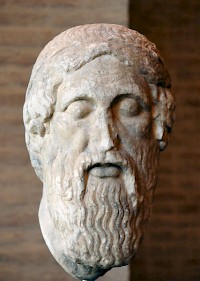Homer on the Cyclopes

In the Odyssey, the legendary poet Homer describes many countries and islands in the seas west of Greece, visited by the prototypical traveler Odysseus after the fall of Troy. Among these islands was one that was inhabited by Cyclopes, one-eyed giants that liked to devour human beings. As soon the ancient Greeks started to comment upon the Odyssey, they argued that many places described by Homer could be identified with locations on Sicily, and it was later agreed that the Strait of Messina was the place where the two monsters Scylla and Charybdis had lived, and that the Cyclops was a native of Sicily.
Of course, this is a rather unpoetical approach of a poem, not unlike trying to find Eliot's Waste Land on a map. On the other hand, several modern scholars have argued that the Odyssey does indeed contain some echoes of the first Greek reconnaissance of the island in the west.
The following text is a description of the island of the Cyclopes; the translation was made by Robert Fitzgerald.
Homer on the Island of the Cyclopes
[9.119] [Odysseus saw] an orchard
closed by a pale - four spacious acres planted
with trees in bloom or weighted down for picking:
pear trees, pomegranates, brilliant apples,
luscious figs, and olives ripe and dark.
Fruit never failed upon these trees: winter
and summer time they bore, for through the year
the breathing Westwind ripened all in turn -
one pear came to prime, and then another,
and so with apples, figs, and the vine's fruit
empurpled in the royal vineyard there.
Currants were dried at one end, on a platform
bare to the sun, beyond the vintage arbors
and vats the vintners trod; while near at hand
were new grapes barely formed as the green bloom fell,
or half-ripe clusters, faintly coloring.
After the vines came rows of vegetables
of all the kinds that flourish in every season,
and through the garden plots and orchard ran
channels from one clear fountain, while another
gushed through a pipe under the courtyard entrance
to serve the house and all who came for water.